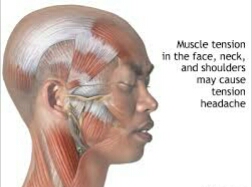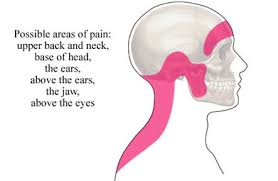A tension headache is generally a diffuse, mild to moderate pain in your head that’s often described as feeling like a tight band around your head. A tension headache (tension-type headache) is the most common type of headache, and yet its causes aren’t well-understood.
Causes:
Tension headaches are caused by muscle contractions in the head and neck regions. A variety of foods, activities, and stressors can cause these types of contractions. Some people develop tension headaches after staring at a computer screen for a long time, or after driving for long periods. Cold temperatures may also trigger a tension headache.

Other triggers for tension headaches include:
- alcohol
- eye strain
- dry eyes
- fatigue
- smoking
- A cold or flu
- a sinus infection
- Caffeine
- Poor posture
- emotional stress.
Symptoms:
Signs and symptoms of a tension headache include:
- Dull, aching head pain
- Sensation of tightness or pressure across your forehead or on the sides and back of your head
- Tenderness on your scalp, neck and shoulder muscles

Tension headaches are divided into two main categories — episodic and chronic.
Episodic tension headaches:
Episodic tension headaches can last from 30 minutes to a week. Frequent episodic tension headaches occur less than 15 days a month for at least three months. Frequent episodic tension headaches may become chronic.
Chronic tension headaches:
This type of tension headache lasts hours and may be continuous. If your headaches occur 15 or more days a month for at least three months, they’re considere chronic.






